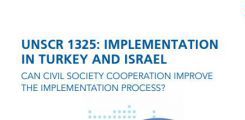 Policy Papers and Reports
/ Israel and the Middle East
Policy Papers and Reports
/ Israel and the Middle East
UNSCR 1325: IMPLEMENTATION IN TURKEY AND ISRAEL
CAN CIVIL SOCIETY COOPERATION IMPROVE THE IMPLEMENTATION PROCESS?
Merav kahana-Dagan and Burcu Degirmencioglu
SUMMARY
October 2020 marks the 20th anniversary of the United Nations Security Council Resolution 1325 (UNSCR 1325) on Women, Peace and Security. This marks a fitting moment to assess the resolution’s challenges and achievements and to offer some suggestions for better implementation of the resolution in two Middle Eastern countries – Israel and Turkey. Two countries with shared bilateral and regional interests as well as disputes and critical roles in many of the area’s conflicts. Israel and Turkey responded to UNSCR 1325 positively, but did not implement it on the ground. UNSCR 1325 led many United Nations (UN) member countries to adopt a National Action Plan (NAP) to implement the ideas and ideals of the resolution (Peacewomen 2020). Most of those countries are in Europe, while only a few of them are in the MENA region. There are eleven Regional Action Plans (RAP) around the world, but there is no formal RAP for the MENA region. Due to many barriers, such as political divisions between countries in the region, ongoing conflicts, and women’s underrepresentation in politics and in decision-making, the push for the implementation of UNSCR 1325 in the MENA region must be supported by the international community. Though the implementation of UNSCR 1325 through a regionwide framework is unlikely, due to political and cultural differences and the ongoing disputes between states, a push for its implementation could also originate from sub-regional cooperation and bilateral agreements.
The 20th anniversary of UNSCR 1325 should also serve as an opportunity to prioritize it on the agenda of Israeli Turkish civil society activities. Furthermore, international exchange amongst female diplomats and security services and gender trainings as well as leadership programs for women in such positions can support the acceptance and the career opportunities for women in foreign and security policy.
Jointly, motivated women from the region and a push from the international community together can achieve improvements for women through inclusion in peace building processes and regional cooperation. This needs long term commitment from young women, who can take up the issues and set the groundwork for the next generation of Middle Eastern women.
INTRODUCTION
Israel and Turkey are important powerful players in the MENA region with a complicated relationship and shared interests such as security, economy, and energy. They are both involved in local and regional conflicts while managing an ongoing dispute between one another, which is highly connected to the Israeli-Palestinian conflict. Both countries formally adopted National Action Plans in the spirit of UNSCR 1325. UNSCR 1325 touched upon two main issues – women are much more affected by conflicts, yet their voices are underrepresented in decision-making. Research shows that women’s participation in peace negotiations increases the sustainability and the quality of the agreements (UN Women 2019). However, for more women to be included in such processes, many steps need to be taken. Israeli-Turkish relations are unstable and complicated. In 2010, after the Mavi Marmara Gaza flotilla clash, diplomatic relations reached their lowest point. Since then, the two countries reached a reconciliation agreement and for two years worked on normalizing their bilateral ties. These efforts did not last long when in May 2018 another political crisis occurred in the wake of the relocation of the US embassy to Jerusalem, and ambassadors from both countries were sent back to their countries. During the past 10 years, NGO’s, think tanks, and civil society organizations worked in order to strengthen Israeli-Turkish relations. The work of NGOs touched upon many aspects of the Israeli-Turkish and regional relations but did not focus on women empowerment or women inclusion in particular. The attached paper argues that it should.


